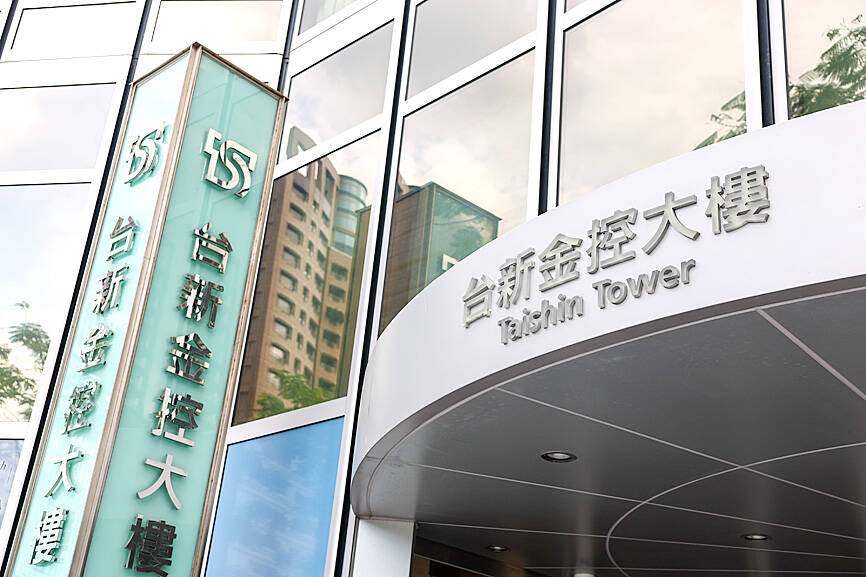Taishin Financial Holding Co (台新金控) yesterday said it is considering adjusting its share swap ratio to compete with CTBC Financial Holding Co’s (中信金控) bid for Shin Kong Financial Holding Co (新光金控).
“The company would make appropriate adjustments to the share swap ratio at an appropriate time,” Taishin Financial president Welch Lin (林維俊) told investors at an earnings conference in Taipei.
Lin’s remarks came as the takeover battle for Shin Kong Financial heats up after CTBC Financial on Friday unveiled the terms of its tender offer.

Photo: CNA
CTBC Financial is offering a share swap ratio of 0.3132 of its shares plus NT$4.09 in cash for each Shin Kong Financial share. Based on CTBC’s closing share price on Friday, that translates into NT$14.55 in cash and stock per share for Shin Kong Financial.
That is better than the NT$11.32 per share offered by Taishin Financial a day earlier: a share swap ratio of 0.6022 of Taishin Financial ordinary shares for each Shin Kong Financial ordinary share, plus a 1:1 swap of their preferred shares.
As CTBC Financial on Monday filed an application with the Financial Supervisory Commission (FSC) for approval of its tender offer bid, Taishin Financial is under growing pressure to sweeten its deal with Shin Kong Financial ahead of the two companies’ respective extraordinary shareholders’ meetings on Oct. 9.
Bid figures change due to fluctuations in the companies’ stock prices, Lin said, but added that Taishin Financial would adjust the share swap ratio if needed.
However, the boards of directors of the two companies would have to repeat the same procedure as on Thursday last week before the share swap ratio can be adjusted, he said.
Taishin Financial also hopes the FSC, which has to respond to CTBC Financial’s application within 15 business days, can support its friendly takeover bid, Lin said.
If the commission approves its rival’s hostile takeover application, it would be unfair to Taishin Financial and pose risks to the domestic financial market, he said.
In the first half of the year, the bank-centric financial conglomerate reported a net income of NT$10.6 billion (US$332 million), up 19.1 percent from NT$8.9 billion a year earlier. It had a book value of NT$13.93 per share, earnings per share of NT$0.74 and return on equity of 11.17 percent.
Taishin International Bank (台新銀行) contributed a net income of NT$8.63 billion in the first half, up 10 percent year-on-year, thanks to an 11.4 percent growth in loans, a 9.8 percent increase in deposits and a 30.6 percent surge in wealth management business, coupled with healthy progress in its credit card business, the company said.
Taishin Financial Holding Co chief financial officer Carol Lai (賴昭吟) said the company expects the central bank to keep interest rates unchanged in the second half of the year, while the US Federal Reserve is likely to cut rates by 0.25 percentage points each next month and in December, which would be beneficial to the company’s foreign currency lending business, Lai added.

Taiwan Semiconductor Manufacturing Co (TSMC, 台積電) would not produce its most advanced technologies in the US next year, Minister of Economic Affairs J.W. Kuo (郭智輝) said yesterday. Kuo made the comment during an appearance at the legislature, hours after the chipmaker announced that it would invest an additional US$100 billion to expand its manufacturing operations in the US. Asked by Taiwan People’s Party Legislator-at-large Chang Chi-kai (張啟楷) if TSMC would allow its most advanced technologies, the yet-to-be-released 2-nanometer and 1.6-nanometer processes, to go to the US in the near term, Kuo denied it. TSMC recently opened its first US factory, which produces 4-nanometer

PROTECTION: The investigation, which takes aim at exporters such as Canada, Germany and Brazil, came days after Trump unveiled tariff hikes on steel and aluminum products US President Donald Trump on Saturday ordered a probe into potential tariffs on lumber imports — a move threatening to stoke trade tensions — while also pushing for a domestic supply boost. Trump signed an executive order instructing US Secretary of Commerce Howard Lutnick to begin an investigation “to determine the effects on the national security of imports of timber, lumber and their derivative products.” The study might result in new tariffs being imposed, which would pile on top of existing levies. The investigation takes aim at exporters like Canada, Germany and Brazil, with White House officials earlier accusing these economies of

Teleperformance SE, the largest call-center operator in the world, is rolling out an artificial intelligence (AI) system that softens English-speaking Indian workers’ accents in real time in a move the company claims would make them more understandable. The technology, called accent translation, coupled with background noise cancelation, is being deployed in call centers in India, where workers provide customer support to some of Teleperformance’s international clients. The company provides outsourced customer support and content moderation to global companies including Apple Inc, ByteDance Ltd’s (字節跳動) TikTok and Samsung Electronics Co Ltd. “When you have an Indian agent on the line, sometimes it’s hard

PROBE CONTINUES: Those accused falsely represented that the chips would not be transferred to a person other than the authorized end users, court papers said Singapore charged three men with fraud in a case local media have linked to the movement of Nvidia’s advanced chips from the city-state to Chinese artificial intelligence (AI) firm DeepSeek (深度求索). The US is investigating if DeepSeek, the Chinese company whose AI model’s performance rocked the tech world in January, has been using US chips that are not allowed to be shipped to China, Reuters reported earlier. The Singapore case is part of a broader police investigation of 22 individuals and companies suspected of false representation, amid concerns that organized AI chip smuggling to China has been tracked out of nations such